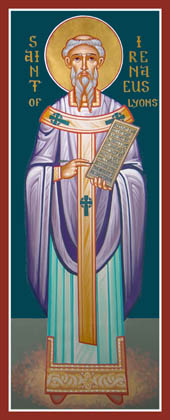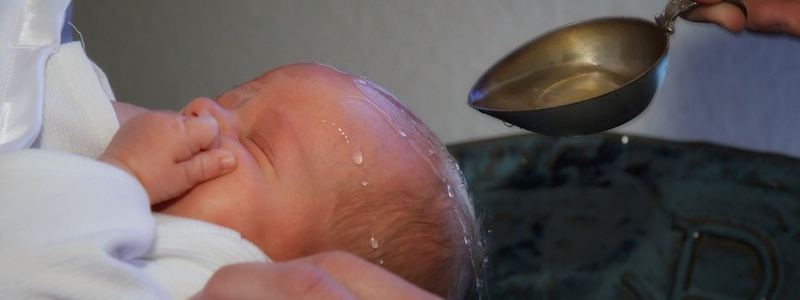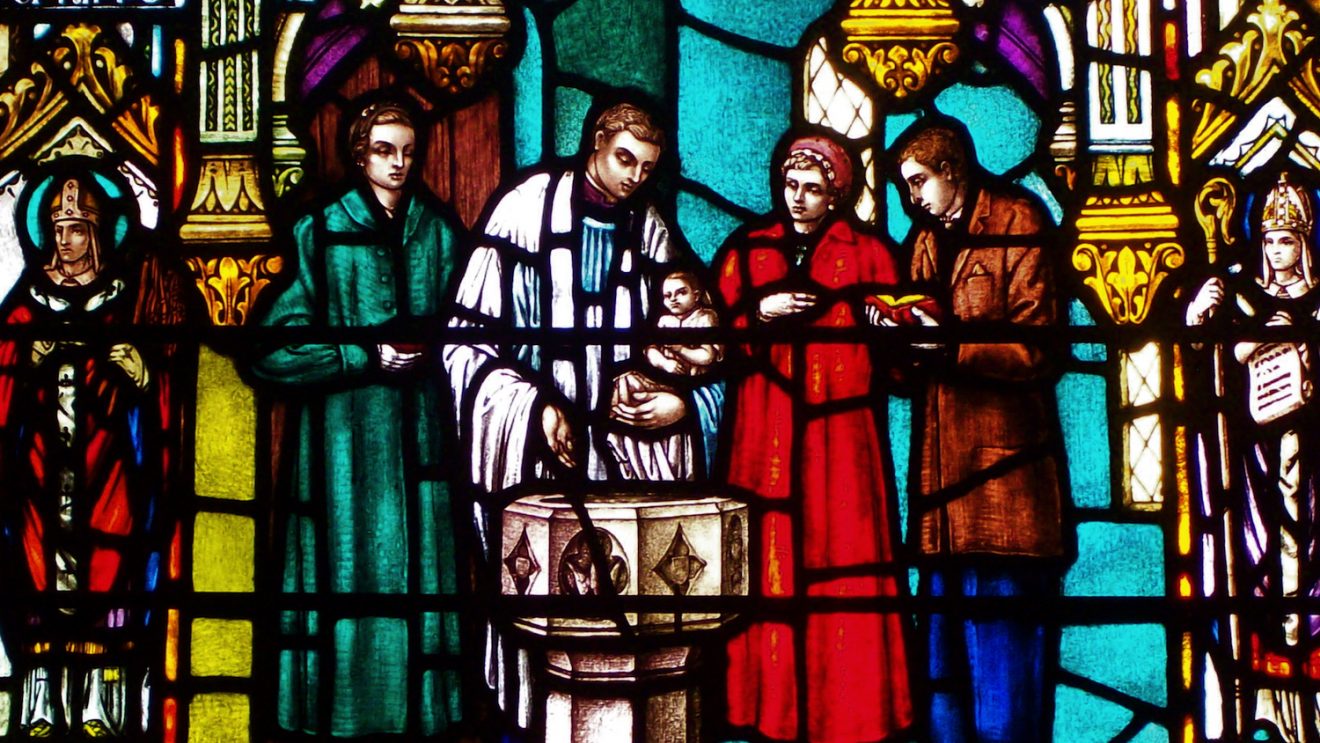In the Gospel of Mark (10:13-14), we read:
And people were bringing children to him that he might touch them, but the disciples rebuked them. When Jesus saw this he became indignant and said to them, let the children come to me; do not prevent them, for the Kingdom of God belongs to such as these.
The question of why Catholics baptize infants is not new. Often, this question is asked by those contemplating entrance into the Catholic Church or certain non-Catholic Christians. For two millennia, the Church has responded to such inquiries by appealing to Sacred Scripture and her Magisterial teachings.
SCRIPTURAL ROOTS AND GATEWAY TO NEW LIFE
What general statements can be made about baptism? First, we should observe that Jesus requires baptism for entrance into heaven (Jn 3:5; Mk 16:16). St. Paul instructs us that we are born with Adam’s sin, thereby requiring baptism (Rom 5:18-19). The Catechism of the Catholic Church (#1213) teaches that baptism is “the basis of the whole Christian life, the gateway to life in the Spirit…and the door which gives access to the other sacraments. Through baptism, we are freed from sin and reborn as sons of God; we become members of Christ, are incorporated into the Church and made sharers in her mission: baptism is the sacrament of regeneration through water in the word.”
In the Essential Catholic Handbook of the Sacraments (pp. 25-26), Fr. Thomas Santa writes that “…when Jesus appeared at the Jordan to receive John’s baptism, he was at the crossroads of a new direction in his life. The traditional understanding of this is that he was moving from his hidden life to his public life.” After Jesus’ death and resurrection, the early Church “offered baptism to all who desired to follow Jesus, almost upon request (see Acts 8:36). Later, as the Church became more established and possibly also as a result of persecutions of the Church, it became the practice to introduce a time of waiting and preparation before baptism was celebrated. The second century writer Tertullian observed that Christians are made, not born. This process served the Church well until societal pressures and the collapse of the Roman Empire necessitated that a change be made. With a high infant mortality rate, St. Augustine worried that non-baptized infants could not merit eternal life and would suffer eternal damnation. As such, it appears that through Augustine’s persuasion, the logic of withholding baptism from infants in favor of a potential adult baptism at a later date seemed to lose its moorings.”
AGE OF REASON
According to Father Frank Chacon and James Burnham, fundamentalist Christians often charge that since infants lack the necessary intellect to properly receive the Lord, they should be denied baptism until a later, more “reasoned” time. These same Christians, adherents of the Protestant doctrine known as sola-scriptura, must also come to terms with the scriptural evidence which indicates that entire households were baptized, infants included. For example, in Acts 16:15, Lydia was converted by Paul’s preaching and was baptized with her household. In Acts 16:33, we are informed of the Phillipian jailer, whom Paul and Silas had converted to the faith, being baptized that night along with his entire household. In his greetings to the Corinthians (1 Cor 1:16), St. Paul reminds us that he did baptize the household of Stephanas.
Despite not having attained the age of reason [see Can. 97 §2. A minor before the completion of the seventh year is called an infant and is considered not responsible for oneself (non sui compos). With the completion of the seventh year, however, a minor is presumed to have the use of reason.], this reality was deemed insufficient to prohibit an infant’s integration into the New Covenant in a similar way in which a child, eight days after birth, would become part of the Old Covenant through circumcision (see Col 2:11-12). As parents “stepped in” for their children in that ritual, so also do parents in the New Covenant ritual. (Fr. Frank Chacon and James Burnham, Beginning Apologetics: How to explain and defend the Catholic Faith, pp. 36.)
To this regard, the Catechism of the Catholic Church (#s 1250-1252) declares:
The sheer gratuitousness of the grace of salvation is particularly manifested in infant Baptism. The Church and the parents would deny a child the priceless grace of becoming a child of God were they not to confer Baptism shortly after birth. Christian parents will recognize that this practice also accords with their role as nurturers of the life that God has entrusted to them. The practice of infant Baptism is an immemorial tradition of the Church. There is explicit testimony to this practice from the second century on, and it is quite possible that, from the beginning of the apostolic preaching, when whole ‘households’ received baptism; infants may also have been baptized.
Similarly, a 1980 document issued by the Congregation for the Doctrine of the Faith (Instruction on Infant Baptism, 24 October 1980, page 4) notes:
The fact that infants cannot yet profess personal faith does not prevent the Church from conferring this sacrament on them, since in reality it is in her own faith that she baptizes them. This point of doctrine was clearly defined by St. Augustine: ‘When children are presented to be given spiritual grace, it is not so much those holding them in their arms who present the children—as the whole company of saints and faithful Christians…It is done by the whole Mother Church which is in the saints, since it is a whole that she gives birth to each and every one of them.’ This teaching is repeated by St. Thomas Aquinas and all the theologians after the child who is baptized believes not on its own account, by a personal act, but through others, ‘through the Church’s faith communicated to it.’ This same teaching is also expressed in the new Rite of Baptism, when the celebrant asks the parents and godparents to profess the Faith of the Church, the Faith in which the children are baptized.
Continuing, the Congregation reaffirmed the teachings of the Council of Trent, namely that baptism is not just a sign of faith but also a cause of faith, producing in the baptized interior enlightenment that causes faith to be received within the soul and the veil of blindness to fall before the brightness of Christ. Nonetheless, many contrarians to infant baptism suggest that we have no right to impose upon an individual a religious obligation which may, at some future point, be rejected. Here, the CDF reminds us that “such an attitude is simply an illusion: there is not such thing as pure human freedom. Even on the natural level, parents make choices for their children that are essential for their life and for their orientation toward true values… Those who claim that the sacrament of baptism compromises a child’s freedom forget that every individual baptized or not, is, as a creature, bound by indefeasible duties to God, duties which baptism ratifies and ennobles through the adoption as a child of God. They also forget that the New Testament presents entry into the Christian life not as a form of slavery constraint but as admittance to true freedom. Finally, for those who claim that the practice of infant baptism comes from a pastoral use lacking missionary impetus, the Church insists that this sacrament is the visible sacrament of Christ in the world, with the mission of extending to everyone the sacramental link between her and her glorified Savior. Accordingly, she cannot fail to wish to give to everyone, children no less than adults, the first basic sacrament of baptism… If understood in this way, the practice of infant baptism is truly evangelical, since it has force of witness, manifesting God’s initiative and the gratuitous character of the love with which He surrounds our lives: not that we loved God but that he loved us…we love, because he first loved us. (Instruction on Infant Baptism, pp. 5-7)
In his book, Christening: The Making of Christians (pp.48), author Mark Searle unpacks the modern idea that becoming a Christian is an “individual, private decision.” He notes that “this is not a Christian perspective. The Christian life and Christian faith are not, in the first instance at least, something we do for God, but something God does for us. Both faith and the life of grace are essentially the work of the Spirit within us, a Spirit freely given by God to those whom he chooses.”
OF APOSTOLIC ORIGIN
Infant baptism, while supported by scripture, is moreover a practice of apostolic origin that may be found in the words of the Fathers…
 He came to save all through Himself, – all, I say, who through Him are reborn in God, – infants, and children, and youths and old men. Therefore He passed through every age, becoming an infant for infants, sanctifying infants; a child for children, sanctifying those who are of that age; and at the same time becoming for them an example of piety, of righteousness, and of submission; a young man for youths, becoming an example for youths and sanctifying them for the Lord. So also He became an old man for old men so that He might be the perfect teacher in all things… (St. Irenaeus, Against Heresies, A.D. 180)
He came to save all through Himself, – all, I say, who through Him are reborn in God, – infants, and children, and youths and old men. Therefore He passed through every age, becoming an infant for infants, sanctifying infants; a child for children, sanctifying those who are of that age; and at the same time becoming for them an example of piety, of righteousness, and of submission; a young man for youths, becoming an example for youths and sanctifying them for the Lord. So also He became an old man for old men so that He might be the perfect teacher in all things… (St. Irenaeus, Against Heresies, A.D. 180)
Let them remove their clothing. Baptize first the children; and if they can speak for themselves, let them do so. Otherwise, let their parents or other relatives speak for them. (St. Hippolytus of Rome, The Apostolic Tradition, A.D. 215)
Every soul that is born into flesh is soiled by the filth of wickedness and sin…And if it should seem necessary to do so, there may be added to the aforementioned considerations the fact that in the Church, baptism is given for the remission of sins; and according to the usage of the Church, baptism is given even to infants. And indeed if there were nothing in infants which required a remission of sins and nothing in them pertinent to forgiveness, the grace of baptism would seem superfluous. (Origen, Homilies on Leviticus, A.D. 244)
The Church received from the Apostles the tradition of giving baptism even to infants. (Origen, Commentaries on Romans, A.D. 244)
As to what pertains to the case of infants: you said that they ought not to be baptized within the second or third day after their birth, and that the old law of circumcision must be taken into consideration, and that you did not think that one should be baptized and sanctified within the eighth day after his birth. In our council it seemed to us far otherwise. No one agreed to the course which you thought should be taken. Rather, we all judged that the mercy and grace of God ought to be denied to no man born. (St. Cyprian of Carthage, Letter of Cyprian and of his colleagues in council to the number of sixty-six: to Fidus, A.D. 251/252)
Do you have an infant child? Allow sin no opportunity; rather, let the infant be sanctified from childhood. From his most tender age let him be consecrated by the Spirit. Do you fear the seal because of the weakness of nature? O what a pusillanimous mother, and of how little faith! Give your child the Trinity, that great and noble protector. (St. Gregory of Nazianz, Oration on Holy Baptism, A.D. 381)
…You see how many are the benefits of baptism, and some think its heavenly grace consists only in the remission of sins; but we have enumerated ten honors. For this reason we baptize even infants, though they are not defiled by sin: so that there may be given to them holiness, righteousness, adoption, inheritance, brotherhood with Christ, and that they may be His members. (St. John Chrysostom, Baptismal Catecheses, A.D. 388-389)
Unless a man be born again of water and the Holy Spirit, he cannot enter the kingdom of God. No one is excepted: not the infant, not the one prevented by some necessity. They may, however, have an undisclosed exemption from punishments; but I do not know whether they can have the honor of the kingdom. (St. Ambrose of Milan, Abraham, A.D. 387)
Since others respond for children, so that the celebration of the Sacrament may be complete for them, it is certainly availing to them for their consecration, because they themselves are not able to respond. But if someone were to respond on behalf of a person who could make himself make answer, it would not likewise be of avail. (St. Augustine of Hippo, Baptism, A.D. 400)
The custom of Mother Church in baptizing infants is certainly not to be scorned, nor is it to be regarded in any way as superfluous, nor is it to be believed that its tradition is anything except Apostolic. The age of infancy also has a great weight of witness; for it was the infant age that first merited to pour out its blood for Christ. (St. Augustine of Hippo, The Literal Interpretation of Genesis, A.D. 401-415)
If anyone says that because little children do not have actual faith, they are not to be numbered among the faithful after receiving baptism, and that, for this reason, they are to be re-baptized when they have reached the age of discretion; or that it is better to omit their baptism rather than to baptize them solely in the faith of the Church while they do not believe by an act of their own, anathema sit. (Council of Trent, Seventh Session: Canons on the Sacrament of Baptism, A.D. 1547)
Through the ages, Holy Mother Church has taught that baptism incorporates us into the mystical Body of Christ. The graces that flow from this foundational sacrament make us God’s adopted sons and daughters! To recall the words of Mark Searle:
The Christian life and Christian faith are not, in the first instance at least, something we do for God, but something God does for us. Both faith and the life of grace are essentially the work of the Spirit within us, a Spirit freely given by God to those whom he chooses.
In asking why the Catholic Church baptizes infants, let us revisit the words of Jesus in Mark’s Gospel:
Let the children come to me; do not prevent them, for the Kingdom of God belongs to such as these.









